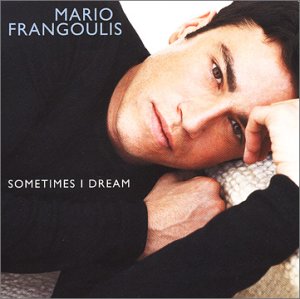

Courtesy of Mario Frangoulis

A FIRESIDE
CHAT WITH MARIO FRANGOULIS
Is Mario Frangoulis
the next Andrea Bocelli? That very well may be, but Bocelli, certainly,
in the high brow opera world is not spoken in fond terms as an "operatic
tenor." The crowning of Bocelli as the "fourth tenor" (and
how many fourths did we have) was premature and rather dubious when considering
Bocelli's dabbles with opera have been met with lukewarm reception at
best. Bocelli, his success (sales and popularity) and his lack there of
(opera) places great pressure on Frangoulis, as he releases his debut
on Sony Classical, Sometimes I Dream, a diverse and interesting work.
Whether he meets Bocelli's enormous popularity and icon status remains
to be seen, but he certainly has the voice for it and Sony certainly has
the money. The rest is up to fate, if there is such a thing in the entertainment
industry anymore. Frangoulis sat down to speak about his beginnings and
his new record, unedited and in his own words.
FRED JUNG: After all the work, it's nice to find success.
MARIO
FRANGOULIS: I don't know, Fred. It feels great. I've been working on getting
out there in the big world for quite a while now, with shows in London
and also, theater, stage, theatrical stage, and also opera and some recordings
that I've already done in Greece. This is the real big step out onto the
international circuit. It feels good. It feels a little scary, but it's
good. It's fulfilling after so long. It has taken me three years to actually
come to this stage and now is when I believe real work starts to tell
you the truth, with promoting the album, with letting people know who
I am and what I'm all about.
FJ:
What have been the most challenging obstacles?
MARIO
FRANGOULIS: The most difficult were big theaters outside of my country
in Greece. The standards are very, very high like La Scala in Milan, for
example, was a very difficult step or challenge. I was on the same stage
with people that had been in the business for many, many years and who
had the experience of playing in lots of big theaters. So that is one
of the things and the other was to be able to communicate in another language
as well as my own, Greek. That is another thing. My biggest thing is communication
really. I believe that if you are going to reach people, you have to be
able to communicate with them, whether it is through your music or through
your speaking.
FJ: Milanos are not a forgiving audience.
MARIO
FRANGOULIS: It was very satisfying. I only had, unfortunately the way
things turned out, I only had two weeks to rehearse and play the role
of Tony in West Side Story at La Scala. It was very, I sort of jumped
in there and it was like swimming in the deep suddenly. But it was very
gratifying and one thing that I enjoyed very much, a memory that I hold
dear from that experience was the fact that I met a couple of ladies who
were working backstage and they were sweeping the stage and taking care
of the backstage, Italian ladies and they said that I was the Greek tenor
and they were so glad I was here and they would watch my steps and throughout
the rehearsal and then on the night of the performance, they watched on
the side and then afterwards they came back and congratulated me and thanked
me. I thought that was really fantastic because they had nothing to gain
from me for being so honest. That was a great thing that I got from them.
FJ: People of Greece are known for their family ties that bind. To be
without must have had unspoken hardships.
MARIO
FRANGOULIS: I was separated from my real parents when I was four years
old. I lived with my mother's sister for the rest of my life and she was
a big driving force behind me in my career and my personal life. She's
been an amazing mother. The truth is I do not have the striking experiences
and such apart from the separation from my real parents and the fact that
I truly had a wonderful childhood with my foster parents, my mother's
sister. She's been amazing. She introduced me to classical singing. She
kept me going at times when I was feeling very low. We're a very united
family.
FJ: That inner strength is audible in your music.
MARIO
FRANGOULIS: Absolutely, Fred. As I said before, it is the driving force
behind everything I do and I was always listening to her advice. Unfortunately,
I lost her a year ago from breast cancer and so that was a great loss
in my life because her kind of love and support is really irreplaceable,
the same with my father. I lost my father only three months ago. That's
a big loss as well. They gave me so much strength and to believe that
life goes on and that I must continue growing as an artist and as a human
being. I want to live by their example.
FJ: I'm sure they are pleased.
MARIO
FRANGOULIS: Thank you, yes, I know they are. I know they are watching
from up there.
FJ: Audacious to interpret pop tunes on a classical debut.
MARIO
FRANGOULIS: You mean like "Nights in White Satin."
FJ: Are you a fan of the Moody Blues?
MARIO
FRANGOULIS: Yes, I've been a Moody Blues fan for many years since I was
a kid. "Nights in White Satin" is an old time classic and one
of my favorite songs of all time. It kept popping up every now and then
in my life and I always thought what a great song to sing, but I never
actually thought that I would be performing it. When I was doing my research,
it actually took me three years to come to this from day one when I started
doing research for this record. The song came up again as one of my favorite
songs and I thought, "How do I get in touch with the Moody Blues,"
and especially with Justin Hayward, who performed it back in the Sixties.
I was fortunate enough that my producer, Steve Wood had done some orchestrations
for them.
Fred Jung is the Editor-In-Chief and can't believe it's butter. Comments?
Email Him